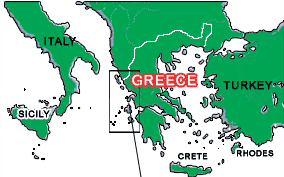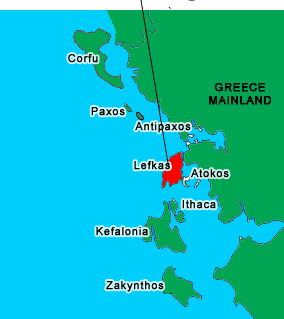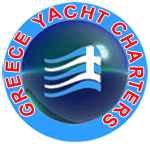Greece: Lefkas - Private Yachts and Charters
Lefkas - a traditional Greek Ionian Island; beautiful scenery, mountains and beaches.
It seems to to have so much variety of scenery within one relatively small island. It is green (verdant as it says in all good Greek guides), has spectacular coastlines, superb beaches (if you are willing to look for them), traditional Greek night life, ghostly deserted mountain villages, and lovely, warm people. It all seems to be contained within Lefkas.
There is not a lot in the way of clubs and discos except for a few in Nidri. Most young people who go there are attracted by the boating and wind surfing. Neither is it a bucket and spade kind of island. The beaches on the Nidri side are essentially pebbly, but the sea is warm and shallow, ideal for paddling and safe swimming. The beautiful sandy beaches on the other side are more serious, they do have strong currents and the sea can be rough.
In antiquity, Lefkas was known as 'Leucas', or white, after the white cliffs on the southern Cape Lefkatas. 'Kavos tis Kyras', or the Cape of the Lady, as it is also known, was made infamous by the ancient Greek poet, Sappho.
Sappho, writing in the sixth century BC, was considered by Plato to be the 'Tenth muse' and today to have been 'the first modern poet'. Legend has it that she flung herself from the cliff at Cape Lefkatas when Phaeon rejected her love.


[Back to Greece Yacht Charters >>
SELECT A YACHT TYPE:
Greece Power Yachts | Greece Catamarans | Greece Sailing Yachts
Where now stands a lighthouse, was once a Temple dedicated to the god Apollo. It is said that the priests of the temple would safely act out Sappho's leap. Later, it became popular practice with fashionable and dramatic Romans who were rejected by their lovers to follow Sappho's example, being careful to employ constructed 'wings' to soften their fall and to position rescue parties in the sea below! We can assume that it is Cape Lefkatas that Homer refers to as the White Rocks, in his Epic poem, The Odyssey, but where exactly the island stands in the legend is unclear. The islands that are today known as Ithaca, Kefalonia and Lefkas were not always known by these names and different theories claim that each of the islands was in fact Odysseus' Ithaca. Nineteenth century archaeologist, Wilhelm Dorpfeld, assisted with Heinrich Schlieman's excavations of Ithaca.Contact us for more information on booking charters in this area or any surrounding areas. We specialize in private crewed yacht charter vacations worldwide.
 Welcome to Greece Charters. We offer luxury yacht charters on Greece power yachts and Greece sailing yachts and catamarans. Our Greece Yacht charters includes Ionion yacht charters and Cyclades yacht charters along with the Saronic Gulf
Welcome to Greece Charters. We offer luxury yacht charters on Greece power yachts and Greece sailing yachts and catamarans. Our Greece Yacht charters includes Ionion yacht charters and Cyclades yacht charters along with the Saronic Gulf